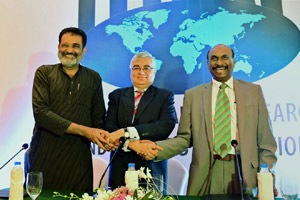Parthasarathi Shome, former chairman of the Tax Administration Reforms Commission, has accepted a new challenge — to head India’s first “apolitical thinktank” which claims to be free from corporate or sectoral bias. The new body, International Tax Research and Analysis Foundation (ITRAF), will be based in Bengaluru. TV Mohandas Pai, former CFO and Board member of Infosys, and Suresh Senapathy, former CFO and board member of Wipro, are the other founding members of ITRAF, which was launched on Monday. In an interaction with Mahesh Kulkarni, Shome explains the idea behind ITRAF and its goals. Edited excerpts:
What factors led to the formation of ITRAF?
In India we have a lot of research organisations that make policy recommendations. But one reason why those recommendations are ignored or few of them make it into the policy makers’ decisions is because often analytical components of those recommendations are missing. So, many institutions become advocacy groups. Secondly, in the tax area, I see that after almost two years, there is uncertainty in the environment. Yet, no one can question the genuineness of the wish of this government to remove red tape and give red carpet. Then why are investors not convinced yet? They do want ease doing business and in between there is a gap and that gap is ‘databased anaytical research’. Very often it is said there is no data in our country. If you really look carefully, there is a lot of data available. We have education surveys and detailed population surveys. We have a whole set of database of prowess on the basis of corporate balance sheets. You also have income tax returns. The tax department may not make it available. Perhaps that can be used. Using all that we can make policy recommendations which cannot be ignored by the authorities. That is the idea behind forming this.
What are the broad objectives of ITRAF?
ITRAF will work towards improving the international tax ecosystem in India focused on principles of equity, certainty, convenience, harmony and economy through economic and statistical research and analysis. It will be an independent, unbiased forum for meaningful public debate to enhance tax policy formulation and administration. We will provide thought leadership to ensure tax policies synchronise with changing changing technology and business landscape. We will undertake economic and statistical studies on taxation rules in India. We will also examine and suggest measures to the government on tax administration reforms, and preventing tax evasion.
What are the research areas the think-tank will focus on immediately?
We are going to look primarily at international tax issues. How our taxpayers are affected by international tax developments. First area is base erosion and profit shifting (BEPS), an area that has impacted the corporate sector of much of the world. It is how companies behave by shifting profits from one jurisdiction to another to minimise their global profits. There is a a huge BEPS project in OECD. We want to check all that and different people are working on different action points of BEPS that are divided into 15 action points in Paris. We want to look at each action points and see its relevance in India. We will publish a series of working papers. Secondly, we want to look at the GST’ structure and its place in the international benchmarking framework. And how we compare with the rest of the world. What are the transition issues, is it a good thing to move? But, we are going to focus on the international components of it. Third, we want to look at the MAT issue. Not just on FIIS, but the whole concept of MAT.
Will it act as a lobby group to influence government policies?
To begin with, being an analytical research organisation, it will take us some time to formulate policy recommendations because we want to do in-depth research. There are econometric methods, balance sheet methods and so on which are very fundamental. We are now downloading some information on the corporate sector. There are gaps and there are methods on how you combine various years so that the gaps can be subsumed. That will probably take a month. There are approaches where corporate representatives and academicians come together and conduct research using these modern methods. There are certain institutions that do very good research but the impact is less. So, we have to marry the two.
Will you make recommendations to the government on taxation issues?
We will do fundamental research on tax knowledge. One of the offshoots of that will be what the government will want to take from us. Our research will be of such high quality, that the government will listen to us. We will not influence the government nor lobby with it. My one condition in forming this body is that it will not be a lobby group funded by the corporate sector.

